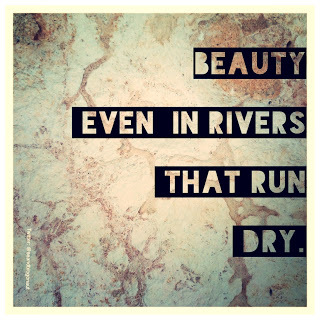S.B. Wright's Blog, page 3
January 29, 2018
POST-IT NOTE POETRY RETURNS FOR A 6TH YEAR
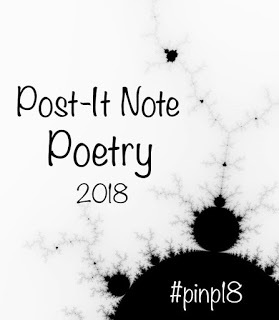 Post-It Note Poetry (PINP), incepted 2012 as a writing dare, returns for its 6th year next month.
Post-It Note Poetry (PINP), incepted 2012 as a writing dare, returns for its 6th year next month. Begun by writing partners, Adam Byatt and Jodi Cleghorn, the dare was to write bad poetry on post it notes. From humble beginnings, it quickly caught the quirk and imagination of poets and non-poets alike across social media. Many foundation participants return each year to exercise their micro poetry muscles.
How does one go about participating?
The ‘rules’ are simple:
Write/build/create a poem every day of February.The poem must fit on a post-it note (or be an equivalent sized poem -- ie. no more than 8 lines – on a larger backing).Poem must adhere to the original light-hearted spirit of permission to write badly – in which poems can tackle serious content, but internal editors/critic all get a break over February.Post poems to social media with the hashtag #pinp18. Follow the hashtag and enjoy what others are creating.
Where can I see some examples?
You can check out the Facebook page (you'll have to join). You can checkout the Twitter Feed Archive page. Or you can wait until we all start posting Feb 1st on the 2018 Twitter feed curated by myself or follow Jodi on Instagram.
Media/Journalists?
Check out the press release here.
Published on January 29, 2018 23:55
January 26, 2018
That Summer and an Update.
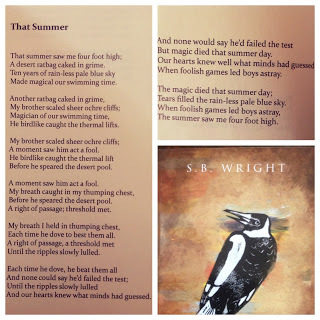 Lot's of stuff going on at the moment.
Lot's of stuff going on at the moment.Prep for heading back to school (running a library and teaching some new classes), keeping up with my artistic commitments and experimenting with digital poetics.
Phew!
I attended a digital poetry course last weekend and I am tentatively having a go and seeing how the internet responds.
Digital poetry is proving to be a handful. Lots of skills to upgrade i.e. learning new apps, getting a very basic grounding in meshing words and pictures successfully.
The third instalment of my writing program is coming but until that time enjoy the picture and poem to your right(it was constructed using Pic Stitch). It's from my debut collection, a pantoum.
You can listen to me read it below.
Published on January 26, 2018 21:46
January 21, 2018
Beauty
Published on January 21, 2018 23:22
January 16, 2018
Poetry Process: Element 2 - Studying Poetic Technique and Theory.
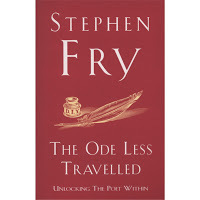 ...sounds like a really boring title for a really boring and heavy part of my poetry process.
...sounds like a really boring title for a really boring and heavy part of my poetry process.But it's not. Honest.
So, where to begin?
From the beginning I wanted to expand my knowledge, not only of the technical, nuts and bolts side of things, but also catch up a bit on the history and movements of poetry, the watershed essays and break out poets/poem.
To tap into my/our poetic heritage.
The Basic Approach
Within this study component I followed this basic approach*:
Read the text (essay, chapter/section of a book) or listen to a podcastTake notesReflectAsking myself, do I agree?Does this conflict with what else I have read?Can I see what they are talking about (Theory/Technical Aspects)?Can I think of other examples of what they are talking about(technical aspects)? Do I, can I do this in my own poetry (technical aspects)?It became a conversation with myself that continues to this day.
The Texts
Now when I began, I was working as a supply teacher (substitute/emergency etc) and money was tight. You can spend thousands of dollars on poetry technique and theory books but it's not vital. I started with online resources.
Starting points for Theory
The first of these was The Poetry Foundation and specifically their collection of Essays on Poetic Theory, there's a couple of months worth of reading there no doubt. I found myself learning not just about poetry mind you, but larger societal movements as well.
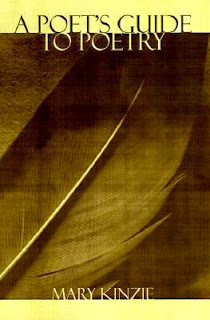 Starting points for TechniqueThere are hundreds if not thousands of articles online, written by a variety of people from those simply regurgitating, to those who have a much keener insight. My Books On Poetry page lists some interesting books that could get you started, most of them should be in your library and all bar one are are entry level reads.
Starting points for TechniqueThere are hundreds if not thousands of articles online, written by a variety of people from those simply regurgitating, to those who have a much keener insight. My Books On Poetry page lists some interesting books that could get you started, most of them should be in your library and all bar one are are entry level reads.I will say that, there are a multitude of How to Write a Poem books, complete with exercises and advice, but none that I have come across with the depth of Mary Kinzie's A Poet's Guide to Poetry. As an example of how fine this book goes, it had me considering word and letter choice in my poems for the individual effect of the sound a single letter can have on proceeding words.
Another good place to start brushing up some technical skills might be the aforementioned Poetry Foundation at the Learn page.
I could give you lists of books, you could even recommend some in the comments, but I loved the organic approach that grew from this start. I could follow my own interests, divert off on tangents, create my own canon.
Have you got any essays or texts that spoke to you? Feel free to list them in the comments. The Next part in this series will be the element Writing Poetry
* Now, I have outlined it here for ease of understanding but this is a organic process, our minds don't necessarily work this logically
Poetry Process Series
Reinvigorating my process or Year of Poetry 2.0Poetry Process - Element 1: Close Reading and Ana...
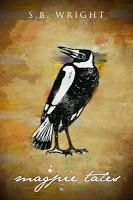 In Magpie Tales Australian poet SB Wright reveals a keen eye for capturing both people and places, his deft imagery transports the reader effortlessly from rural Australia and beyond. The pieces within explore a changing inner landscape too, where the contested terrain of small town identities and national issues are played out in clear, lyrical verse.
Magpie Tales
is his first poetry collection.
In Magpie Tales Australian poet SB Wright reveals a keen eye for capturing both people and places, his deft imagery transports the reader effortlessly from rural Australia and beyond. The pieces within explore a changing inner landscape too, where the contested terrain of small town identities and national issues are played out in clear, lyrical verse.
Magpie Tales
is his first poetry collection.Available in print: Amazon Aus, US / Book Depository / Booktopia / Bookworld / Barnes & Noble / Fishpond
Signed Copies: On request
Published on January 16, 2018 18:33
Acknowledging dissatisfaction (Waaahmbulancing)
 Today I made a fool of myself (this is a semi-regular occurrence).
Today I made a fool of myself (this is a semi-regular occurrence). I applied to the Melbourne Art Book Fair under a regional writers application stream. Made it through the entire application form and sent it off.
It was only when I sat down to spread the information, through blogging. to my fellow poets, that I realised the extent of my mistake.
It's the Arts Book Fair, not the Arts & Book Fair i.e. it's a fair design to showcase Artbooks and publishing.
I could blame the heat, the fact that I have already been working for half of the holiday period to get ready for next(this) year., but ...honestly I think it stemmed from the fact that Poetry gets pretty short shrift when it comes to the ever dwindling pool of Arts funding and I leapt at the chance to take advantage (and by take advantage I mean, motivated myself, despite acute anxiety and shyness) of support for regional writers.
Le sigh.
Things could be worse, yes. I am very fortunate (exceedingly fortunate with regards to poetry publishing) but a podcast (Commonplace : Episode 42: Gabrielle Calvocoressi) and a post (ren powell's Poet's Who Get Lonely ) have led me to think that maybe it's healthy to voice dissatisfaction even briefly, before I have to put on my big boy pants and just do the work .
That and it was easier to express my dissatisfaction than to write a detailed post about my poetry process (which is coming).
Feel free to be dissatisfied with your lot in the comments, you'll get no judgement or "helpful" advice from me (unless you ask for it ).
 In Magpie Tales Australian poet SB Wright reveals a keen eye for capturing both people and places, his deft imagery transports the reader effortlessly from rural Australia and beyond. The pieces within explore a changing inner landscape too, where the contested terrain of small town identities and national issues are played out in clear, lyrical verse.
Magpie Tales
is his first poetry collection.
In Magpie Tales Australian poet SB Wright reveals a keen eye for capturing both people and places, his deft imagery transports the reader effortlessly from rural Australia and beyond. The pieces within explore a changing inner landscape too, where the contested terrain of small town identities and national issues are played out in clear, lyrical verse.
Magpie Tales
is his first poetry collection.Available in print: Amazon Aus, US / Book Depository / Booktopia / Bookworld / Barnes & Noble / Fishpond
Signed Copies: On request
Published on January 16, 2018 01:02
January 6, 2018
Poetry Process - Element 1: Close Reading and Analysis
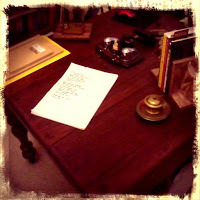 The writing desk never looked
The writing desk never looked this clean againIn my post, Reinvigorating My Poetry Process or Year of Poetry 2.0, I mentioned the four elements of my process; Writing Poetry, Studying Poetic Technique and Theory, Close Reading & Analysis and Reflection.
I begin with Close Reading & Analysis because it takes the pressure of you. You can get straight on with up-skilling your craft and you don't have to worry about writing the greatest poem ever(yet).
So how do you Close Read and Analyse a Poem?
Anyway you want to...
but it helps to have some guidance until you develop your own style/preference.
I began by using The Close Reading of Poetry - A Practical Introduction and Guide to Explication, by Kim Blank & Magdelena Kay. It's from the English Department of University of Victoria.
I used Print Friendly to create a .pdf copy that I could print or carry on an offline device. (Aside: I actually prefer doing most of my writing and study in long-form i.e. hand written in journals)
The document breaks down into the following topic headings:
1. Title 2. Key Words & Tone 3. Word Order 4. Figurative Language; Imagery 5. Sound: Rhythm & Rhyme 6. Speaker & Voice 7. Time & Setting 8. Symbol 9. Form 10. Ideas & ThemeMy beginning process was to basically follow this list from point 1 to 10, writing down my observations and findings for each topic.
As the year progressed I began to "bolt on" some extra's as I went, picking up bits and pieces.
Early on I developed a rule that I should read the poem at least 3 times before sitting down to analyse it. So...
Reading
Read first for meaning, viewing the poem as a whole.Read out loud and be conscious of the way the words sound (it's also a good idea to get in practice at reading aloud, your poems or other's)Read by the line i.e. slow your reading right down.I didn't follow this process 100% of the time but certainly in the earlier stages. After awhile I think your brain just begins to do several of these things at once.
Writing
The poem you are close reading and not your own obviously.
Within the first couple of Close Readings I just found it practical to write the poem out. It would have been easier to print poems (especially those online) and stick them in, but I amassed a reasonable sized collection of poetry in book form that I didn't want to deface with my scrawl (that and it's very frustrating holding the book open for an hour while you are completing your analysis.
The added benefit to writing out the poem was that I believe it got me closer to the words, allowed me to pick up on things that didn't seem apparent after three readings. It was actually quite a pleasurable experience for me.
 Optional extras
Optional extras
I think you could easily start with the resources above Reading, Writing out the Poem and using the Guide but I wanted to mention a couple of things I added. Now again, I didn't apply these all of the time, sometimes I forgot and sometimes they weren't relevant.
Scansion and Stress/Syllable Counts (under Word Order heading)
I'd usually scan a poem and break it down into feet, even if it wasn't an obviously metered poem, just to observe patterns. I'd sometimes alternate this type of investigation with simply recording in different coloured pens, the basic syllable count and the number of hard stresses in each line, in two columns at the end of the line.
I'd also note enjambment or end stopped lines in a similar fashion, so that I could see at a quick glance how the poem varied its line endings and examine the effect that groupings of say, end stopped lines had on the sound of the poem.
Sentence Lengths/ Sentence Endings/ Line endings (under Word Order heading)
I think I may have picked up the importance of sentence lengths from reading Richard Hugo's, The Triggering Town. So in analysing a poem I found it interesting to note how long the sentence was in comparison to its fellows(what was the effect of alternating short and long sentences or stringing similar sized sentences together), whether it ended with the stanza or ran across it.
I also noted how a sentence ended. In Hugo's essay, Nuts and Bolts, he suggested that you should:
End more than half your lines and more than two thirds of your sentences on words of one syllable.It was interesting to see the effect of a short, hard stress, sans other line end attention grabbers like rhyme, at the end of a line and the effect produced by having more or less than 50 % of your lines ending in this fashion.
In Summary
Read the poem- for meaning, sound(read out loud), and by single lineWrite the poem out long hand with space for marking it upApply the topics in A Practical Introduction and Guide to ExplicationSummarise main discoveries ( to help with reflection journal later) in dot point form.
This process was fairly detailed and depending on the poem it could take 1-2 hours. I firmly believe it's time well spent and will pay you back in your own writing. A list of the poems that I applied this process to can be found here.
The next post in this series will be on developing a reading list for study in Studying Poetic Technique and Theory. Feel free to comment or ask questions. Do you follow a similar process?
 In Magpie Tales Australian poet SB Wright reveals a keen eye for capturing both people and places, his deft imagery transports the reader effortlessly from rural Australia and beyond. The pieces within explore a changing inner landscape too, where the contested terrain of small town identities and national issues are played out in clear, lyrical verse.
Magpie Tales
is his first poetry collection.
In Magpie Tales Australian poet SB Wright reveals a keen eye for capturing both people and places, his deft imagery transports the reader effortlessly from rural Australia and beyond. The pieces within explore a changing inner landscape too, where the contested terrain of small town identities and national issues are played out in clear, lyrical verse.
Magpie Tales
is his first poetry collection.Available in print: Amazon Aus, US / Book Depository / Booktopia / Bookworld / Barnes & Noble / Fishpond
Signed Copies: On request
Published on January 06, 2018 21:23
January 5, 2018
Magpie Tales Book Plates
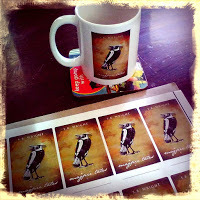 I am preparing a post about Close Reading and Analysis as part of my writing process, but we are experiencing extreme heat in Australia at the moment ( 85 F inside the house, 98.6 F in the shade at 9.30am) so here's a short post announcing the arrival of my bookplates.
I am preparing a post about Close Reading and Analysis as part of my writing process, but we are experiencing extreme heat in Australia at the moment ( 85 F inside the house, 98.6 F in the shade at 9.30am) so here's a short post announcing the arrival of my bookplates.If you were an overseas reader and wanted to save costs on a signed copy you can buy from the cheapest retailer for your location below, and then contact me and I will send you out a signed bookplate that you can stick in the front of your copy.
As you can see, I did buy myself a mug with my book cover and the first poem in the collection on it, this was mostly because Vistaprint were going to charge me $10 postage for two sheets of stickers, mostly... nothing to do with stroking my own ego.
 In Magpie Tales Australian poet SB Wright reveals a keen eye for capturing both people and places, his deft imagery transports the reader effortlessly from rural Australia and beyond. The pieces within explore a changing inner landscape too, where the contested terrain of small town identities and national issues are played out in clear, lyrical verse.
Magpie Tales
is his first poetry collection.
In Magpie Tales Australian poet SB Wright reveals a keen eye for capturing both people and places, his deft imagery transports the reader effortlessly from rural Australia and beyond. The pieces within explore a changing inner landscape too, where the contested terrain of small town identities and national issues are played out in clear, lyrical verse.
Magpie Tales
is his first poetry collection.Available in print: Amazon Aus, US / Book Depository / Booktopia / Bookworld / Barnes & Noble / Fishpond
Signed Copies: On request
Published on January 05, 2018 15:32
January 2, 2018
Reinvigorating my process or Year of Poetry 2.0
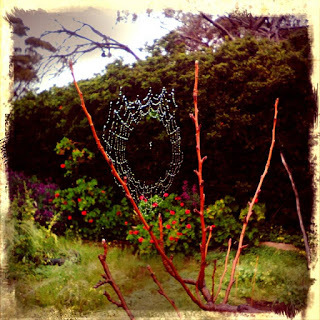 In 2016, in an attempt to up-skill myself with regard to poetry, I embarked on an intensive, self designed and self paced, Year of Poetry programme.
In 2016, in an attempt to up-skill myself with regard to poetry, I embarked on an intensive, self designed and self paced, Year of Poetry programme.I didn't at the time have the funds to attempt a Masters* and short courses and other pathways of learning seemed sparse and inaccessible.
You can read about the program at length here.
Briefly though, the final statistics looked something like this:
Total project time: 457:08 hrs
Consisting of :
Writing poems 214:48 hrsClose reading/ Analysis = 87:15 hrsStudy of technique and theory =105:13 hrsWeekly and monthly journal reflection = 40:04 hrs
I wrote 42 completed poems, had 21 poems in draft, submitted 27 poems, had 9 poems published, completed 2 live performances, had 1 interview and received 16 rejections.
It was a big success both in terms of the stated goals-
I want to exceed publication credits for this year (2015) so that's 4 published poems. I want to write at least 12 poems of publishable quality. I want to increase my own poetic understanding through reading technical material and through reading of other's good poetry.
which I had hit by mid year and that the majority of these poems formed the backbone of my debut collection.
So as part of the Bloggers Revival Tour I wanted to revisit the program, revise some of the aspects that could use tweaking, adapt it to my much more demanding lifestyle (full time teacher librarian versus part time substitute teacher) and share with readers some of the nuts and bolts of what I did.
Going back over my posting from 2016 I didn't write down my process in any great detail. So that's what I intend to do in the first few posts of this tour; give an overview of the programme and then expand on its major elements using examples.
The Overview
The Process™ consists of 4 elements: Writing Poetry, Studying Poetic Technique and Theory, Close Reading & Analysis and Reflection.
Although I break these down into discreet elements the most important, the one that should receive the lion's share of your attention, is the writing of poetry. I would suggest weighting your effort in that direction if time becomes tight.
The other elements are important, they provide a fertile mix for the writing to develop from. The structure, though is there as a frame, not a box or a rule you can't deviate from. Always have in the back of your mind that you are here to write poems.
Beware the tendency to hide from the writing in the other elements but also beware the tendency to keep hammering away at the poem that isn't working. I found working on the other elements often helped my subconscious to figure out what was wrong with the poem I had spent too much time on.
Below is the break down of the time spent on each element in 2016. I think this worked well, 50% Writing and Revision, 40 % Study and Close Reading, 10 % Reflection.
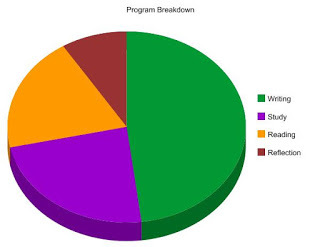
Where do you start?
It doesn't really matter. I began with Close Reading and Analysis because that offered the quickest way for me to get started and to feel that I was getting somewhere.
I think that half the issue with any kind of writing is getting to the table/desk/porch to write. If you are following a plan it's easier (for me at least). Reading someone's work closely and unraveling it brings on an almost meditative state. So that's what my next post will be about.
* I am not convinced that in terms of poetry or other career prospects, that's even a worthwhile path/ outlay of funds.
 In Magpie Tales Australian poet SB Wright reveals a keen eye for capturing both people and places, his deft imagery transports the reader effortlessly from rural Australia and beyond. The pieces within explore a changing inner landscape too, where the contested terrain of small town identities and national issues are played out in clear, lyrical verse.
Magpie Tales
is his first poetry collection.
In Magpie Tales Australian poet SB Wright reveals a keen eye for capturing both people and places, his deft imagery transports the reader effortlessly from rural Australia and beyond. The pieces within explore a changing inner landscape too, where the contested terrain of small town identities and national issues are played out in clear, lyrical verse.
Magpie Tales
is his first poetry collection.Available in print: Amazon Aus, US / Book Depository / Booktopia / Bookworld / Barnes & Noble / Fishpond
Signed Copies: On request
Published on January 02, 2018 21:35
Great Poetry Deals and Booktopia Free Shipping
I have taken the liberty of scanning through the poetry bargains at Booktopia for collections that might interest my Australian and New Zealand readers so that you might benefit from Booktopia's reduced prices and free shipping. *
Additionally if you were hanging out to buy a copy of my debut collection, or my stablemate over at Close-Up Books, Mark William Jackson, sans the shipping, you can get free shipping from today until Monday the 10th of January (Check out the specifics of that deal below).
But on to the Books. First, these two emerging poets :)
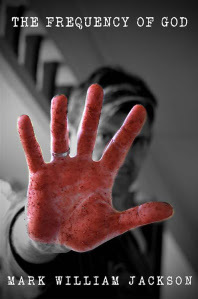 $18.25 from BootktopiaIn his first collection, Australian poet Mark William Jackson is by turns reflective and rallying, as he explores closeness and distance, love and change, and perfectly articulates the hostile coopting of social space by technology.
The Frequency of God
is his first poetry collection.
$18.25 from BootktopiaIn his first collection, Australian poet Mark William Jackson is by turns reflective and rallying, as he explores closeness and distance, love and change, and perfectly articulates the hostile coopting of social space by technology.
The Frequency of God
is his first poetry collection.
 $18.25 from BooktopiaIn Magpie Tales Australian poet SB Wright reveals a keen eye for capturing both people and places, his deft imagery transports the reader effortlessly from rural Australia and beyond. The pieces within explore a changing inner landscape too, where the contested terrain of small town identities and national issues are played out in clear, lyrical verse.
Magpie Tales
is his first poetry collection.
$18.25 from BooktopiaIn Magpie Tales Australian poet SB Wright reveals a keen eye for capturing both people and places, his deft imagery transports the reader effortlessly from rural Australia and beyond. The pieces within explore a changing inner landscape too, where the contested terrain of small town identities and national issues are played out in clear, lyrical verse.
Magpie Tales
is his first poetry collection.
And the rest, a mix of old and new collections from Australian and International poets.
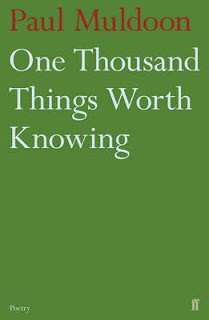 $8.80 from BooktopiaPaul Muldoon's new book, his twelfth collection of poems, is wide-ranging in its subject matter yet is everywhere concerned with watchfulness. Heedful, hard won, head-turning, heartfelt, these poems attempt to bring scrutiny to bear on everything, including scrutiny itself.
$8.80 from BooktopiaPaul Muldoon's new book, his twelfth collection of poems, is wide-ranging in its subject matter yet is everywhere concerned with watchfulness. Heedful, hard won, head-turning, heartfelt, these poems attempt to bring scrutiny to bear on everything, including scrutiny itself.
One Thousand Things Worth Knowing confirms Nick Laird's assessment, in the New York Review of Books, that Paul Muldoon is 'the most formally ambitious and technically innovative of modern poets, [who] writes poems like no one else.'
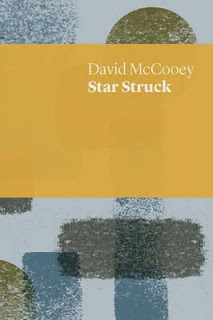 $11.50 from BooktopiaWith poems ranging from the confessional to the mock-autobiographical, from imagism to a strange storytelling, from the comic and satirical to the plangent and disturbing, Star Struck startles us with the many faces of lyric poetry.
$11.50 from BooktopiaWith poems ranging from the confessional to the mock-autobiographical, from imagism to a strange storytelling, from the comic and satirical to the plangent and disturbing, Star Struck startles us with the many faces of lyric poetry.
This book of poems by the award-winning poet David McCooey is made up of four sections. The first documents an alienating encounter with a life-threatening illness. The second plays out an unforgettable obsession with darkness and light. The third brings together popular music and the ancient literary mode of the pastoral. In this highly original sequence we find, among other things, Bob Dylan singing Virgil, Joni Mitchell reflecting on life in Laurel Canyon, a lab monkey pondering the sound of music, and a bitter, surreal rewriting of ‘Down Under’ for our times. In the final section, narrative poetry is cast in an intensely new and uncanny light.
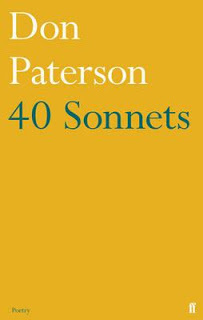 $13.95 from Booktopia This new collection from Don Paterson, his first since the Forward prize-winning Rain in 2009, is a series of forty sonnets. Some take a more traditional form, some are highly experimental, but what these poems share is a lyrical intelligence and musical gift that has been visible in his work since his first book of poems, Nil Nil, in 2009.
$13.95 from Booktopia This new collection from Don Paterson, his first since the Forward prize-winning Rain in 2009, is a series of forty sonnets. Some take a more traditional form, some are highly experimental, but what these poems share is a lyrical intelligence and musical gift that has been visible in his work since his first book of poems, Nil Nil, in 2009.
Addressed to children, friends and enemies, the living and the dead, musicians, poets and dogs, these poems display an ambition in their scope and tonal range matched by the breadth of their concerns. Here, voices call home from the blackout and the airlock, the storm cave and the seance, the coalshed, the war, the ringroad, the forest and the sea. These are voices frustrated by distance, by shot glass and bar rail, by the dark, leaving the 'sound that fades up from the hiss, / like a glass some random downdraught had set ringing, / now full of its only note, its lonely call . . .'
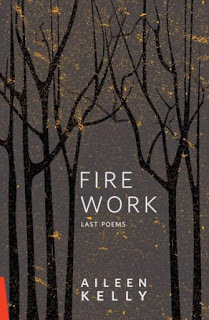 $16.50 from BooktopiaThe poems are abrupt, distilled and beautifully rhythmed. Life is her object and her passion, as always. The language has the essentia autonomy of poetry, and yet these poems are directly personal, involving family and friends, their bodies and her own, and her own experience among delicately defined landscapes. Inevitably, it seems, poem after poem is also metaphysical, and socially aware.
$16.50 from BooktopiaThe poems are abrupt, distilled and beautifully rhythmed. Life is her object and her passion, as always. The language has the essentia autonomy of poetry, and yet these poems are directly personal, involving family and friends, their bodies and her own, and her own experience among delicately defined landscapes. Inevitably, it seems, poem after poem is also metaphysical, and socially aware.
Perhaps the briefest description, however, is the best: here is wit and imagination.
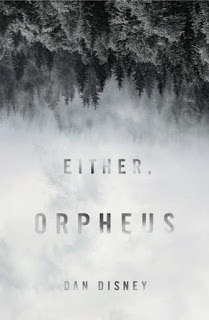 $11.50 from Booktopia "Dan Disney’s highly original either, Orpheus remakes the villanelle. The ‘sound-swarms’ in this contemporary ‘orphic’ work riff laterally on received poetic and philosophical ideas and incorporate fascinating shreds of thinking and saying.
$11.50 from Booktopia "Dan Disney’s highly original either, Orpheus remakes the villanelle. The ‘sound-swarms’ in this contemporary ‘orphic’ work riff laterally on received poetic and philosophical ideas and incorporate fascinating shreds of thinking and saying.
Rainer Maria Rilke and Søren Kierkegaard are the presiding spirits in the volume, and Disney is also in discussion about divergent ways of seeing and understanding with writers from all over the globe. This inventive poetry explores culture, authenticity and translation, and quizzes the lyric modes of apostrophe and song."
— Paul Hetherington
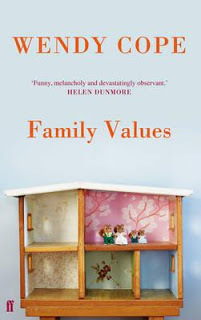 $12.75 from BooktopiaFrom a motorway service area to her ambivalent relationship with religion, Wendy Cope covers a wide range of experience in her new collection. Her mordant humour and formal ingenuity are in evidence, even as she remembers the wounds of a damaging childhood; and in poems about love and the inevitable problems of ageing she achieves an intriguing blend of sadness and joy.
$12.75 from BooktopiaFrom a motorway service area to her ambivalent relationship with religion, Wendy Cope covers a wide range of experience in her new collection. Her mordant humour and formal ingenuity are in evidence, even as she remembers the wounds of a damaging childhood; and in poems about love and the inevitable problems of ageing she achieves an intriguing blend of sadness and joy.
Two very different sets of commissioned poems round off a remarkable volume, whose opening poem sounds clearly the profound note of compassion which underlies the whole.
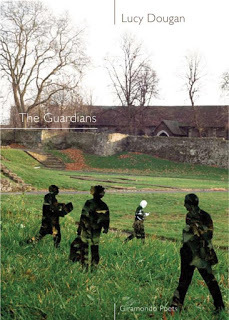 $15.75 from Booktopia Many poems in this collection explore the intrusions of 'the wild' into daily life, through memories, in illness, and in places that you've lost or left behind. In The Guardians, Dougan is interested in the ways in which the past re-enters the present, particularly through the secrets of family life, in all kinds of atavism, and in pockets of wildness in the suburbs and the city which are a source of liveliness and a dark sort of energy.
$15.75 from Booktopia Many poems in this collection explore the intrusions of 'the wild' into daily life, through memories, in illness, and in places that you've lost or left behind. In The Guardians, Dougan is interested in the ways in which the past re-enters the present, particularly through the secrets of family life, in all kinds of atavism, and in pockets of wildness in the suburbs and the city which are a source of liveliness and a dark sort of energy.
Her poems feature old houses, ruins, revisited places; they focus on the bonds between the generations, between children and adults, humans and animals, and humans and the physical world. The title of the collection refers broadly to these ties, which impose a sense of guardianship on those who are bound by them. In contrast to the wildness they recognise, the poems themselves seek to tread lightly - they aspire to quietness and reticence, to cumulative rather than immediate effects, and to sustaining a relatively natural and unobtrusive voice.
* Note: This post contains affiliate links which means I get a kick back at no cost to you.
Free Shipping Deal
Use CELEBRATE at checkout to receive Free Shipping
Place an order and spend a minimum of $17 before midnight Wednesday the 10th of January
(AEST and NZST) with the promotion code CELEBRATE, and you will receive free shipping on your order. The promotion code can be used as many times as you, or your family and friends, want on any orders between now and then.
Additionally if you were hanging out to buy a copy of my debut collection, or my stablemate over at Close-Up Books, Mark William Jackson, sans the shipping, you can get free shipping from today until Monday the 10th of January (Check out the specifics of that deal below).
But on to the Books. First, these two emerging poets :)
 $18.25 from BootktopiaIn his first collection, Australian poet Mark William Jackson is by turns reflective and rallying, as he explores closeness and distance, love and change, and perfectly articulates the hostile coopting of social space by technology.
The Frequency of God
is his first poetry collection.
$18.25 from BootktopiaIn his first collection, Australian poet Mark William Jackson is by turns reflective and rallying, as he explores closeness and distance, love and change, and perfectly articulates the hostile coopting of social space by technology.
The Frequency of God
is his first poetry collection. $18.25 from BooktopiaIn Magpie Tales Australian poet SB Wright reveals a keen eye for capturing both people and places, his deft imagery transports the reader effortlessly from rural Australia and beyond. The pieces within explore a changing inner landscape too, where the contested terrain of small town identities and national issues are played out in clear, lyrical verse.
Magpie Tales
is his first poetry collection.
$18.25 from BooktopiaIn Magpie Tales Australian poet SB Wright reveals a keen eye for capturing both people and places, his deft imagery transports the reader effortlessly from rural Australia and beyond. The pieces within explore a changing inner landscape too, where the contested terrain of small town identities and national issues are played out in clear, lyrical verse.
Magpie Tales
is his first poetry collection.And the rest, a mix of old and new collections from Australian and International poets.
 $8.80 from BooktopiaPaul Muldoon's new book, his twelfth collection of poems, is wide-ranging in its subject matter yet is everywhere concerned with watchfulness. Heedful, hard won, head-turning, heartfelt, these poems attempt to bring scrutiny to bear on everything, including scrutiny itself.
$8.80 from BooktopiaPaul Muldoon's new book, his twelfth collection of poems, is wide-ranging in its subject matter yet is everywhere concerned with watchfulness. Heedful, hard won, head-turning, heartfelt, these poems attempt to bring scrutiny to bear on everything, including scrutiny itself. One Thousand Things Worth Knowing confirms Nick Laird's assessment, in the New York Review of Books, that Paul Muldoon is 'the most formally ambitious and technically innovative of modern poets, [who] writes poems like no one else.'
 $11.50 from BooktopiaWith poems ranging from the confessional to the mock-autobiographical, from imagism to a strange storytelling, from the comic and satirical to the plangent and disturbing, Star Struck startles us with the many faces of lyric poetry.
$11.50 from BooktopiaWith poems ranging from the confessional to the mock-autobiographical, from imagism to a strange storytelling, from the comic and satirical to the plangent and disturbing, Star Struck startles us with the many faces of lyric poetry. This book of poems by the award-winning poet David McCooey is made up of four sections. The first documents an alienating encounter with a life-threatening illness. The second plays out an unforgettable obsession with darkness and light. The third brings together popular music and the ancient literary mode of the pastoral. In this highly original sequence we find, among other things, Bob Dylan singing Virgil, Joni Mitchell reflecting on life in Laurel Canyon, a lab monkey pondering the sound of music, and a bitter, surreal rewriting of ‘Down Under’ for our times. In the final section, narrative poetry is cast in an intensely new and uncanny light.
 $13.95 from Booktopia This new collection from Don Paterson, his first since the Forward prize-winning Rain in 2009, is a series of forty sonnets. Some take a more traditional form, some are highly experimental, but what these poems share is a lyrical intelligence and musical gift that has been visible in his work since his first book of poems, Nil Nil, in 2009.
$13.95 from Booktopia This new collection from Don Paterson, his first since the Forward prize-winning Rain in 2009, is a series of forty sonnets. Some take a more traditional form, some are highly experimental, but what these poems share is a lyrical intelligence and musical gift that has been visible in his work since his first book of poems, Nil Nil, in 2009. Addressed to children, friends and enemies, the living and the dead, musicians, poets and dogs, these poems display an ambition in their scope and tonal range matched by the breadth of their concerns. Here, voices call home from the blackout and the airlock, the storm cave and the seance, the coalshed, the war, the ringroad, the forest and the sea. These are voices frustrated by distance, by shot glass and bar rail, by the dark, leaving the 'sound that fades up from the hiss, / like a glass some random downdraught had set ringing, / now full of its only note, its lonely call . . .'
 $16.50 from BooktopiaThe poems are abrupt, distilled and beautifully rhythmed. Life is her object and her passion, as always. The language has the essentia autonomy of poetry, and yet these poems are directly personal, involving family and friends, their bodies and her own, and her own experience among delicately defined landscapes. Inevitably, it seems, poem after poem is also metaphysical, and socially aware.
$16.50 from BooktopiaThe poems are abrupt, distilled and beautifully rhythmed. Life is her object and her passion, as always. The language has the essentia autonomy of poetry, and yet these poems are directly personal, involving family and friends, their bodies and her own, and her own experience among delicately defined landscapes. Inevitably, it seems, poem after poem is also metaphysical, and socially aware.Perhaps the briefest description, however, is the best: here is wit and imagination.
 $11.50 from Booktopia "Dan Disney’s highly original either, Orpheus remakes the villanelle. The ‘sound-swarms’ in this contemporary ‘orphic’ work riff laterally on received poetic and philosophical ideas and incorporate fascinating shreds of thinking and saying.
$11.50 from Booktopia "Dan Disney’s highly original either, Orpheus remakes the villanelle. The ‘sound-swarms’ in this contemporary ‘orphic’ work riff laterally on received poetic and philosophical ideas and incorporate fascinating shreds of thinking and saying. Rainer Maria Rilke and Søren Kierkegaard are the presiding spirits in the volume, and Disney is also in discussion about divergent ways of seeing and understanding with writers from all over the globe. This inventive poetry explores culture, authenticity and translation, and quizzes the lyric modes of apostrophe and song."
— Paul Hetherington
 $12.75 from BooktopiaFrom a motorway service area to her ambivalent relationship with religion, Wendy Cope covers a wide range of experience in her new collection. Her mordant humour and formal ingenuity are in evidence, even as she remembers the wounds of a damaging childhood; and in poems about love and the inevitable problems of ageing she achieves an intriguing blend of sadness and joy.
$12.75 from BooktopiaFrom a motorway service area to her ambivalent relationship with religion, Wendy Cope covers a wide range of experience in her new collection. Her mordant humour and formal ingenuity are in evidence, even as she remembers the wounds of a damaging childhood; and in poems about love and the inevitable problems of ageing she achieves an intriguing blend of sadness and joy. Two very different sets of commissioned poems round off a remarkable volume, whose opening poem sounds clearly the profound note of compassion which underlies the whole.
 $15.75 from Booktopia Many poems in this collection explore the intrusions of 'the wild' into daily life, through memories, in illness, and in places that you've lost or left behind. In The Guardians, Dougan is interested in the ways in which the past re-enters the present, particularly through the secrets of family life, in all kinds of atavism, and in pockets of wildness in the suburbs and the city which are a source of liveliness and a dark sort of energy.
$15.75 from Booktopia Many poems in this collection explore the intrusions of 'the wild' into daily life, through memories, in illness, and in places that you've lost or left behind. In The Guardians, Dougan is interested in the ways in which the past re-enters the present, particularly through the secrets of family life, in all kinds of atavism, and in pockets of wildness in the suburbs and the city which are a source of liveliness and a dark sort of energy. Her poems feature old houses, ruins, revisited places; they focus on the bonds between the generations, between children and adults, humans and animals, and humans and the physical world. The title of the collection refers broadly to these ties, which impose a sense of guardianship on those who are bound by them. In contrast to the wildness they recognise, the poems themselves seek to tread lightly - they aspire to quietness and reticence, to cumulative rather than immediate effects, and to sustaining a relatively natural and unobtrusive voice.
* Note: This post contains affiliate links which means I get a kick back at no cost to you.
Free Shipping Deal
Use CELEBRATE at checkout to receive Free Shipping
Place an order and spend a minimum of $17 before midnight Wednesday the 10th of January
(AEST and NZST) with the promotion code CELEBRATE, and you will receive free shipping on your order. The promotion code can be used as many times as you, or your family and friends, want on any orders between now and then.
Published on January 02, 2018 20:03
January 1, 2018
2018 Poet Bloggers - January
As mentioned earlier in the week I have joined the Revival. Pasted below is a list of other poets participating in the tour. I'll post an updated list every now and then.
Please check them out.
Ringleaders of This New Year’s Resolution:Kelli Russell Agodon http://ofkells.blogspot.com/ Donna Vorreyer https://djvorreyer.wordpress.com
Bloggers to Follow on the Revival TourBeth Adams http://www.cassandrapages.comTeresa Hichens Ballard http://teballard.blogspot.com/Sandra Beasley http://sbeasley.blogspot.comCarolee Bennett https://gooduniversenextdoor.com/Mary Biddinger wordcage.blogspot.com/ Andrea Blythe http://www.andreablythe.comDave Bonta http://vianegativa.usJim Brock http://picturesthatgotsmall.blogspot.com James Brush http://coyotemercury.comAngela T Carr https://angelatcarr.wordpress.com/Patricia Caspers http://www.patriciacaspers.com/I. F. Caton http://analogverse.blogspot.com/Grant Clauser http://www.uniambic.comKevin Connor https://ordinaryaveragethoughts.wordpress.com/Jared Conti http://www.theoracularbeard.com Josephine Corcoran http://www.josephinecorcoran.orgJill Crammond https://jillypoet.wordpress.com/ Jenelle D’Alessandro http://www.borderandgreetme.comLaura E. Davis http://www.dearouterspace.com/Kate Debolt http://www.katedebolt.net/blog/Heather Derr-Smith ferhext.com/ Risa Denenberg https://risadenenberg.weebly.com/blogAmy Dryansky https://amydryansky.comCynthia Schwartzberg Edlow http://cschwartzbergedlow.blogspot.comAndrew Eickstead http://www.unleashingthewordhoard.com Lou Faber https://anoldwriter.comJeannine Hall Gailey webbish6.com Gail Goepfert gailgoepfert.comErica Goss http://ericagoss.comUma Gowrishankar https://umagowrishankar.wordpress.com/Sarah Kain Gutowski mimsyandoutgrabe.blogspot.comCharlotte Hamrick zouxzoux.wordpress.comErin Hollowell beingpoetry.netTrish Hopkinson https://trishhopkinson.com/Jennifer Hudgens https://jenniferelhudgens.wordpress.comCatherine Hume https://catherinehume.wordpress.com/Crystal Ignatowski http://somehiatus.tumblr.com/MJ Iuppa http://mjiuppa.blogspot.com/Charles Jensen https://charles-jensen.com/kinemapoetics-blog/JJS https://thisembodiedcondition.wordpress.comJill McCabe Johnson http://jillmccabejohnson.com/blog-chanson-daventure.htmlCollin Kelley http://www.collinkelley.blogspot.comKathleen Kirk https://kathleenkirkpoetry.blogspot.com/Anita Olivia Koester https://www.forkandpage.com/Lakshmi thiswinterheart.tumblr.comCourtney LeBlanc wordperv.com Lorena P Matejowsky https://nothingbutblueskies.wordpress.com/ Marilyn McCabe OWrite.MarilynonaRoll.wordpress.comAnn Michael www.annemichael.wordpress.comAmy Miller http://writers-island.blogspot.com/James Moore jameswmoore.wordpress.com LouAnn Sheperd Muhm https://louannmuhm.com/January Gill O’Neill http://poetmom.blogspot.com . Shawnte Orion http://batteredhive.blogspot.com/Ren Powell https://renpowell.com/category/poetry/Bethany Reid http://www.bethanyareid.com/ Susan Rich http://thealchemistskitchen.blogspot.com .Lee Ann Roripaugh https://runningbrush.wordpress.com/Sarah Russell https://sarahrussellpoetry.netJennifer Saunders http://www.magpiedays.comCarl Setzer https://questionsall.netMartha Silano: http://bluepositive.blogspot.com/Kim Bailey Spradlin www.kimbaileydeal.netBonnie Staiger https://bonniestaiger.com/Rosemary Starace https://thresholdview.wordpress.com/Hannah Stephenson http://thestorialist.comStephanie Lane Sutton athenasleepsin.wordpress.comChristine Swint https://balancedonedge.blog/ Carey Taylor https://careyleetaylor.com.Dylan Tweney http://dylan20.tumblr.com/Michael Allyn Wells: http://stickpoetsuperhero.blogspot.com/Lesley Wheeler Lesleywheeler.orgAllyson Whipple http://allysonmwhipple.comSean Wright https://sbwrightpoet.blogspot.com.au/
H/T To Collin Kelley of Modern Confessional for the updated list.
Please check them out.
Ringleaders of This New Year’s Resolution:Kelli Russell Agodon http://ofkells.blogspot.com/ Donna Vorreyer https://djvorreyer.wordpress.com
Bloggers to Follow on the Revival TourBeth Adams http://www.cassandrapages.comTeresa Hichens Ballard http://teballard.blogspot.com/Sandra Beasley http://sbeasley.blogspot.comCarolee Bennett https://gooduniversenextdoor.com/Mary Biddinger wordcage.blogspot.com/ Andrea Blythe http://www.andreablythe.comDave Bonta http://vianegativa.usJim Brock http://picturesthatgotsmall.blogspot.com James Brush http://coyotemercury.comAngela T Carr https://angelatcarr.wordpress.com/Patricia Caspers http://www.patriciacaspers.com/I. F. Caton http://analogverse.blogspot.com/Grant Clauser http://www.uniambic.comKevin Connor https://ordinaryaveragethoughts.wordpress.com/Jared Conti http://www.theoracularbeard.com Josephine Corcoran http://www.josephinecorcoran.orgJill Crammond https://jillypoet.wordpress.com/ Jenelle D’Alessandro http://www.borderandgreetme.comLaura E. Davis http://www.dearouterspace.com/Kate Debolt http://www.katedebolt.net/blog/Heather Derr-Smith ferhext.com/ Risa Denenberg https://risadenenberg.weebly.com/blogAmy Dryansky https://amydryansky.comCynthia Schwartzberg Edlow http://cschwartzbergedlow.blogspot.comAndrew Eickstead http://www.unleashingthewordhoard.com Lou Faber https://anoldwriter.comJeannine Hall Gailey webbish6.com Gail Goepfert gailgoepfert.comErica Goss http://ericagoss.comUma Gowrishankar https://umagowrishankar.wordpress.com/Sarah Kain Gutowski mimsyandoutgrabe.blogspot.comCharlotte Hamrick zouxzoux.wordpress.comErin Hollowell beingpoetry.netTrish Hopkinson https://trishhopkinson.com/Jennifer Hudgens https://jenniferelhudgens.wordpress.comCatherine Hume https://catherinehume.wordpress.com/Crystal Ignatowski http://somehiatus.tumblr.com/MJ Iuppa http://mjiuppa.blogspot.com/Charles Jensen https://charles-jensen.com/kinemapoetics-blog/JJS https://thisembodiedcondition.wordpress.comJill McCabe Johnson http://jillmccabejohnson.com/blog-chanson-daventure.htmlCollin Kelley http://www.collinkelley.blogspot.comKathleen Kirk https://kathleenkirkpoetry.blogspot.com/Anita Olivia Koester https://www.forkandpage.com/Lakshmi thiswinterheart.tumblr.comCourtney LeBlanc wordperv.com Lorena P Matejowsky https://nothingbutblueskies.wordpress.com/ Marilyn McCabe OWrite.MarilynonaRoll.wordpress.comAnn Michael www.annemichael.wordpress.comAmy Miller http://writers-island.blogspot.com/James Moore jameswmoore.wordpress.com LouAnn Sheperd Muhm https://louannmuhm.com/January Gill O’Neill http://poetmom.blogspot.com . Shawnte Orion http://batteredhive.blogspot.com/Ren Powell https://renpowell.com/category/poetry/Bethany Reid http://www.bethanyareid.com/ Susan Rich http://thealchemistskitchen.blogspot.com .Lee Ann Roripaugh https://runningbrush.wordpress.com/Sarah Russell https://sarahrussellpoetry.netJennifer Saunders http://www.magpiedays.comCarl Setzer https://questionsall.netMartha Silano: http://bluepositive.blogspot.com/Kim Bailey Spradlin www.kimbaileydeal.netBonnie Staiger https://bonniestaiger.com/Rosemary Starace https://thresholdview.wordpress.com/Hannah Stephenson http://thestorialist.comStephanie Lane Sutton athenasleepsin.wordpress.comChristine Swint https://balancedonedge.blog/ Carey Taylor https://careyleetaylor.com.Dylan Tweney http://dylan20.tumblr.com/Michael Allyn Wells: http://stickpoetsuperhero.blogspot.com/Lesley Wheeler Lesleywheeler.orgAllyson Whipple http://allysonmwhipple.comSean Wright https://sbwrightpoet.blogspot.com.au/
H/T To Collin Kelley of Modern Confessional for the updated list.
Published on January 01, 2018 16:23

